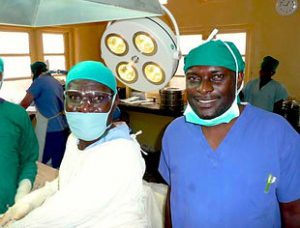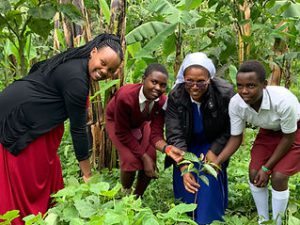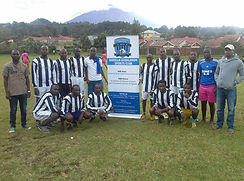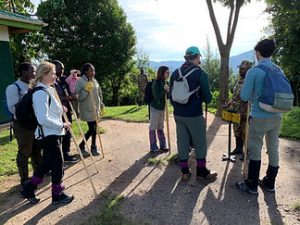Home, Heart, and Habitat
Our commitment at GHC is to ensure economic benefits are balanced with the social and environmental impact that GHC has in the lives of our farmers, their families, and our shared habitats and environment. Our priorities are to ensure health coverage for our farmers with our Kawacare project, guarantee access to education for their children through our School Coffee Clubs, enhance well-being with our youth through engagement with inter-regional and international sports opportunities, encourage ex-poachers to engage in alternative income through becoming trekkers and protectors of the mountain gorillas, and empower women in rural areas with micro-finance lending opportunities and upskilling in tailoring and fashion industry with our House of Bwindi project.
Our partnership with Noble Gorilla Foundation will help us to achieve these goals.
GHC is proud to take part in the High Blood Pressure, Diabetes and Maternal Health project in close collaboration with the Kisiizi Hospital which has recently extended its Strategic Plan until 2019. Our efforts are seconded jointly with neighboring communities of Rwanda and the Democratic Republic of Congo.
GHC has collaborated with hospitals since its foundation in 2016 to help improve the quality of life for coffee communities in a sustainable way. So far we have contributed 5 millions Ugandan Shillings (1400 $USD) to these efforts that have directly impacted the welfare of more than 1000 villagers through health services and the improvement of water sources.
Our Kawacare Health Project is being launched in early 2020. We are seeking donations for this. Please contact us for more details.


UNESCO estimates the Ugandan Primary Education drop out rate to be higher than 68%. Most families in rural Uganda have no means to cover the cost of school materials, uniforms, and fees for all of their children.
GHC is committed to providing higher education opportunities through our innovative School Coffee Clubs. We provide coffee seedlings to the school group, coordinate all agricultural training for growing and taking care of their seedlings, and 4 years later at harvest time, the revenue generated from the coffee is applied to their higher education school fees. Our pilot project at St. Gertrudes Kisoro was launched in May 2019.
To complement academic education we have promoted sports events both for kids and teenagers. Three days a week the kids, independently of their economic status or gender, have the opportunity to join the Rubuguri Athletics Club training sessions with local trainers.
Our goal is to include another 4 clubs in 2020 in this program. Your assistance is both needed and appreciated. Our coffee club is in top-flight Uganda regional football league for Kigezi Region.


From Ex-Poachers to Protectors: Mountain Gorilla EcoTourism Development.
Kigezi is the home of the world’s last remaining mountain gorillas. They are facing extinction due to the pressure from front line communities located in the junction of the Democratic Republic of Congo, Rwanda, and Uganda.
These communities have been traditionally marginalized and in the past, some have turned to poaching as a way of earning income. A change of heart and an opportunity to become Protectors of the Mountain Gorillas through trekking and gorilla tourism has allowed numbers to increase significantly in our Bwindi National Park – from 400 to nearly 500 in recent years. By giving them jobs either in agricultural or touristic activities and involving them in conservation efforts we are all helping to protect the habitats of our mountain gorillas.
Coffee work is mostly done by women who are involved in every step of the coffee production chain, from pruning and harvesting to washing. As part of gender equality and the empowerment of women, GHC has launched a program of small loans for women as an important step leading to their economic stability. Microcredits of US$50 are frequently delivered to women in necessity as a complement to their coffee income.
Further to this, we have launched our House of Bwindi project, a tailoring and sewing project providing women with alternate income in the coffee off-season. Clothing, bags, and beadwork are all part of up-skilling our women farmers – a chance to infuse our coffee passion with fashion.

